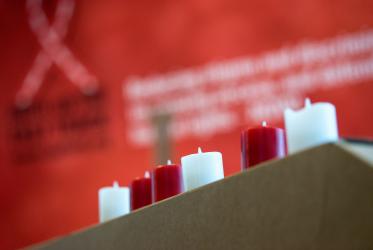The agreement was announced on 28 May, the last day of the WHA, which engaged a variety of church and faith-based organizations among many non-state actors during its week of meetings in Geneva as it grappled with the new arrangement.
“The framework on engagement with non-state actors was arguably the most difficult item to negotiate,” WHO director general, Dr Margaret Chan said in her closing remarks, referring to the effort in reaching a consensus between state actors, corporate interests and non-governmental organizations.
Members of the United Nations, international groups and non-governmental organizations (NGOs) came together at a panel discussion entitled “Global Public Health: The future role of faith-based organizations” held 25 May in the Ecumenical Centre at the World Council of Churches (WCC).
WCC general secretary Rev. Dr Olav Fykse Tveit said, “It is not a discussion of whether faith-based organizations belong to big discourse, but it is one of how shall we do it, and how shall we do it in a decent way.”
Tveit said in seeking a holistic solution to medical health, use can be made of the “commitment, capacity and networks” along with the “real faith, faith in God and faith in the gifts God has given to the church to participate” in the “healing of the world and bringing just communities together.”
During the meeting, representatives of UN groups and the Global Fund to Fight AIDS, Tuberculosis and Malaria said it was easier to deal with representative groups such as the WCC and ACHAP (African Christian Health Associations Platform).
“It is clear that therefore our national governments cannot work alone. They will require strong partnerships and from non-state actors such as Christian health associations,” said Karen Sichinga, ACHAP chairperson noting, “it is estimated that 20 to 60 percent of health care in sub-Saharan Africa is provided by FBOs mainly from the Christian faith.”
Sichinga said the future role of FBOs cannot be underestimated as non-state players are engaged in health services.
“Governments need to transform the way they operate and need to be more cognizant of the role of our association or FBOs. FBOs’ unique role has to be strengthened by national governments and by our international community.
“We have been relied upon by our national government to deliver services at low cost, high efficiency and reduced bureaucracy. We bring to the table value for money serving poor and vulnerable communities for more than 100 years. We have to ensure they are not left out.”
Dr Sam Mwenda, general secretary of the Christian Health Association of Kenya (CHAK) and vice chair of ACHAP said, “FBOs’ engagement with health is a long-term commitment. Even in times of conflict in our nations we continue being there working through our extensive networks.
“We provide a wide range of health services and with compassion to those who are really disadvantaged. We have a lot of investment in infrastructure at parish, national and global levels.”
Mwenda said Christian health associations embrace partnerships and in Kenya they are training doctors and nurses and are responsible for about 40 percent of medical services in the country.
The moderator of the panel, Dr Manoj Kurian, coordinator of the WCC’s Ecumenical Advocacy Alliance (WCC-EAA) noted that the transition from the Millennium Development Goals (MDGs) to the 2030 Sustainable Development Goals (SDG) has shown an unfinished agenda in global public health.
Speakers from Europe, Africa and Asia looked at the transformation from the Millennium Development Goals to the Sustainable Development Goals in which medical services are clearly mapped out.
Dr Cherian Varghese, coordinator for the management of Non Communicable Diseases for the WHO from India noted that civil society along with FBOs are powerful in the medical health services sector.
“At the national level, FBOs can be role models, helping churches to promote good health in their work as providers of health care and with their community participation can influence health literacy,” said Varghese.
“In the international context, the WCC is engaged in global advocacy for highlighting health needs as it participates in global dialogue and policy making.”
Dr Mwai Makoka, executive director of the Christian Health Association of Malawi said that church health groups represent a structure complementary to governments for service delivery.
“They have the same goals but different mandates. The one is constitutional while the other is biblical,” said Makoka.
He noted that medical institutions run by FBOs “are resilient, especially where governments are weak or nonexistent, and in emergencies and epidemics,” while citing the combatting of HIV and AIDS and Ebola.
Dr Bimal Charles, general secretary of the Christian Medical Association of India (CMAI) explained how this group punches above its weight in its operations in many of the Indian states, serving not only minority Christians but all others in the country.
In Allied Health Science, the CMAI runs 25 Allied Health Professional (paramedical) courses through 57 training centres under the Central Education Board of CMAI and also supports many government health ventures in different aspects of health care.
Dr Margaret Chan's closing remarks ate the Sixty-ninth World Health Assembly








